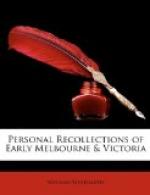through all; and he lived even a goodly number of
years after, but only to do more and more work.
Old General Anderson, of early colonial memory, had
a habit, quite his own, of saying to the face of anyone
whose conduct gave him satisfaction, and in his blunt
soldierly way, “Sir, I have a great respect for
you.” Such an accrediting and not unacceptable
declaration he addressed, times more, I think, than
once, to Fawkner. Indeed, all classes of the colony,
from the highest, in which the gallant colonel moved,
to the humblest, now alike recognized the veteran
who had so long and so well fought for them all.
When at last the spirit quitted the worn-out frame,
and its well-known form, possibly, even to the last,
keeping up still, amongst some few, the lingering
dislike of the long past, was to be no more seen amongst
us, there seemed but one impulse for the occasion,
which fittingly expressed itself in a funeral procession
entirely unprecedented in its every aspect. This
was not less to the colony’s honour than to
that of Fawkner. He died on 4th September, 1869.
Not the least impressive feature of the funeral, perhaps
the most, was the remarkable prayer offered up at
the grave by the Reverend Dr. Cairns. Victoria’s
most eloquent preacher, in giving the true setting
to the life and character of the man, thanked God,
in the name of the colony, for such a life, the influence
and example of which could not but be for good to
all who were to follow. He has fought bravely
for the R.I.P. of the tomb. He rests from his
labours, and his works do follow him.
JAMES SIMPSON, FIRST MAGISTRATE OF “THE SETTLEMENT.”
“He hath an excellent good name.”
—Much Ado About Nothing.
When “The Settlement” began, and when,
like the pre-Judges time in Israel, every man did
as he pleased, the inevitable inconvenience of that
ultra-radical paradise led the small community to seek
out a male Deborah, and, with one accord, they made
choice of James Simpson, their early fellow-emigrant
in the tide from Launceston. Had there been even
a much larger society, the choice would probably have
been as surely the same, for it would have been difficult
indeed to find anyone, who, in the grace and command
of natural presence, exceeded this inaugurator of
authority in Victoria. His figure, rather tall,
shapely, well-developed, surmounted by a noble head,
bald with age, just touching the venerable, and with
a genial expression of face, which, however, never
descended to levity, although times without number
to a smile or slight laugh, he sat erect upon the
bench, facile princeps, as though institutions were
to bend to him, and not he to them. When we entered
the little hut-like structure in the middle of the
Western Market area, so long Melbourne’s only
police-office, James Simpson seemed to us as much a
part of its fittings as the rude little bench itself;
and it was a disappointment not to find him there,




